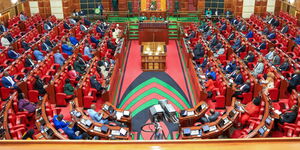The Kenya Revenue Authority (KRA) on Thursday, February 13, announced that the new Income Tax Exemption Rules for Charitable Organisations have officially taken effect a year after they were first introduced.
“The Kenya Revenue Authority (KRA) notifies taxpayers of the operation of Legal Notice No.105 of 2024, the Income Tax Charitable Organisation and Donations Exemption) Rules, 2024, which came into force on June 18, 2024,” KRA stated.
“These Rules guide on the requirements for Income Tax exemption under Paragraph 10 of the First Schedule to the Income Tax Act as well as the conditions for deductibility of expenditure on donations under Section 15(2)(w) of the Income Tax Act,” the state body added.
Through a statement, the tax collector urged affected organisations to comply with the new rules or risk repercussions.
“Applications for Tax exemption received after the effective date of the Rules should comply with the requirements prescribed in the Rules,” KRA stated.
Further, KRA informed organisations that had been granted exemptions before the coming into force of the rules should comply with the prescribed regulations by June 18 this year.
This is in line with the transition period of one year provided for in the rules. Failure to comply with the prescribed date would result in revocation of their income tax exemption certificate.
The first schedule to the Income Tax Act exempts from income tax the income of any institution, body of persons, or irrevocable trust of a public character that is established solely for the relief of poverty, distress of the public, or for the advancement of religion or education.
The new rules introduced new requirements such as the Surplus Funds Restriction, separate tax personal identification number, and definitions of Exempt Charitable Purposes.
In the realm of Surplus Funds Restriction, an exempt charitable organisation may accumulate surplus funds but shall not retain more than the average of fifteen per cent of its funds in a period of three succeeding years without applying the surplus funds to its charitable purposes.
The 2024 Rules define surplus funds as the “excess of income over expenditure in any accounting period”. In addition, the 2024 Rules provide that surplus funds shall not include gains and profits from:
-
A business carried on in the course of or the actual execution of the exempt charitable purposes;
-
The work in connection with the business is mainly carried on by beneficiaries under the exempt charitable purposes; or
-
The gains or profits consist of rent (including premiums or similar considerations like rent) received from the leasing or letting of land and chattels leased or let. Accordingly, this restriction would principally apply to donations and grants received by the exempt charitable organisation.
In the new laws, unrelated business is defined in the 2024 Rules as “any business by way of trade that is regularly carried on by the charitable organisation that is not carried out to support charitable activities provided under paragraph 10 of Part 1 of the First Schedule to the Income Tax Act.”
To that effect, charitable organisations that have been granted an exemption from income tax are required to obtain a separate tax Personal Identification Number (PIN) for any unrelated business and the gains and profits from such business will not be covered by the income tax exemption granted to the charitable organisation.












